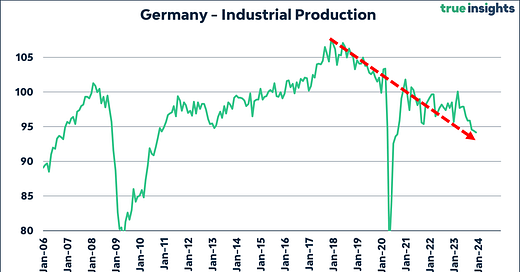A Sick Man by Choice!
Germany is not malfunctioning so much because of structural issues but because of poor management.
Posting the chart above on X always stirs up a storm. It displays Germany’s industrial production, which has been on a seven-year decline despite its reputation as a global industrial giant. It’s disturbing to see Germany striving to become Europe’s ‘sick man’ once again.
Unemployment Isn’t the Culprit
Though the phrase ‘sick man of Europe’ is typically linked to Germany’s economic health, it originally described the dwindling Ottoman Empire in the 19th century. The term resurfaced after the reunification of East and West Germany, which led to unemployment rates of over 10% a decade later. Yet, the current industrial downturn isn’t due to unemployment, which has averaged a low 5.5% since 2017, the lowest in decades. Germany’s policies are the root of its industrial woes.
Poor Policy Choices
The energy crisis stands out as a prime example of self-inflicted harm. The baffling decision by German policymakers to shut down nuclear energy without a reliable alternative is perplexing. Germany’s silence, eight months later,
as nations at that somewhat ‘awkward’ symposium in Davos embraced nuclear energy to fight climate change, was very telling. Germany’s energy policies represent gross mismanagement.
But the issues don’t stop with energy. A maze of regulations, often climate-related, and a shortage of skilled workers are also to blame. BASF, long a leader in the German and European chemical industry, became so frustrated they opted to build their new plant in China. They’re not alone; last year, a third of German industrial firms preferred to invest abroad rather than domestically. The decline of ‘manufacturing Germany’ isn’t just the government’s fault, though. German automakers have been dramatically outpaced in the electric vehicle market, not just by Elon Musk but also by lesser-known Chinese brands, leaving Volkswagen and BMW far behind.
The Path to Recovery
Contrary to the doom and gloom narrative, Germany has every opportunity to rejuvenate its manufacturing sector. It won’t happen overnight, but it’s certainly achievable. This requires making different, smarter decisions. It can be acceptable to trade off some economic prosperity for other goals, provided they are reached.
But the core of the German issue is the sacrifice of substantial economic potential for unrealistic goals set by policymakers, leading to minimal gains. This has sparked significant backlash. Companies like BASF are at their wits’ end. Effective change requires realistic plans that balance diverse interests, minimizing the risk of falling ill once more.








